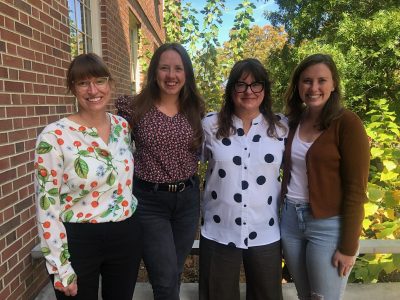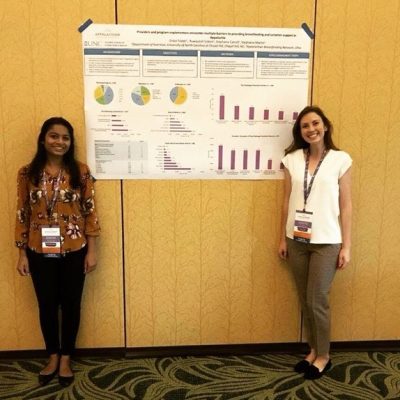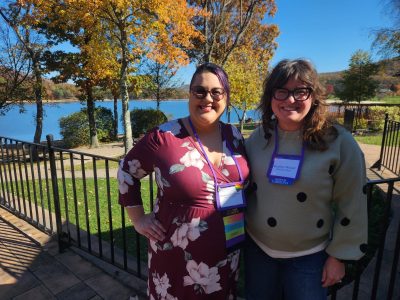Preserving and promoting breastfeeding support in Appalachia
October 26, 2022
Nearly one-third of North Carolina is in Appalachia, where a breastfeeding movement is underway.
The Appalachian Breastfeeding Network (ABN), a nonprofit that aims to transform breastfeeding culture in Appalachia and increase access to care, has already created a 24-hour breastfeeding hotline, a hospital education initiative, a social media campaign to empower parents and an annual conference. ABN’s small but passionate team of breastfeeding support providers is offering these critical services to address the lagging breastfeeding rates in Appalachia, which are much lower than the rest of the nation.
Lack of access to components in human milk in the first months and years of life can contribute to a complex range of health inequities that people in this region face, including infant mortality, obesity, and the risk of heart disease and cancer.

Dr. Stephanie Martin

Stephanie Hutchinson
Inspired by ABN’s work, Stephanie Martin, PhD, assistant professor of nutrition at the UNC Gillings School of Global Public Health, partnered with ABN’s founder and president, Stephanie Hutchinson, MBA, IBCLC, to co-develop a study exploring the challenges ABN members experience when providing lactation support in Appalachia. Lactation professionals and supporters (LPS) work with new parents to facilitate an easier breast or chestfeeding experience, but historically, people in Appalachia are more isolated and have fewer available resources to promote health and lactation support.

From left to right: Dr. Stephanie Martin, Emily Seiger, Dr. Heather Wasser, Grace Foster
Their new study, published today in the American Journal of Public Health (AJPH), is part of a special series about nutrition in the first 1,000-day window – the time from conception to age two. Additional co-authors from the Gillings School include doctoral student Emily Seiger, Assistant Professor Heather Wasser, PhD, Master of Public Health student Grace Foster, and alumna Ruwaydah Sideek, all from the Department of Nutrition.
“Previous research has demonstrated the positive impact lactation support has on breastfeeding outcomes, but less is known about the experiences of the LPS who provide that support to families,” Martin said. “They are critical to improving infant feeding, and we need to ensure they have the training and resources they need to support families. It was striking that so many participants were the only LPS serving several counties, which was the case in several states. Our findings highlight the importance of increasing the number of LPS and ensuring that they all have training to support all people who want to feed human milk and that LPS represent and are from the communities they serve.”
Community-driven solutions for an expansive population
The Appalachian region follows the Appalachian Mountains, spanning from southern New York to northern Mississippi. The mountainous terrain and historical and present inequities create communities that often lack the infrastructure (such as health care and transportation) to ensure adequate access to care. While Appalachia has experienced substantial economic progress over the last five decades, notable health inequities persist. According to the Appalachian Regional Commission,

Ruwaydah Sideek and Grace Foster presented preliminary results of the study at the ABN Conference in 2019.
Martin’s research team co-designed the study with Hutchison, collecting survey and interview data from 89 Appalachian LPS who are members of ABN. These LPS include International Board-Certified Lactation Consultants (IBCLCs); people with other lactation certifications, such as Certified Lactation Counselors (CLCs), government supported breastfeeding peer counselors and La Leche League leaders; and those who provide lactation support through their job or volunteer work but do not have a lactation credential.
Survey questions asked about sociodemographic characteristics, paid or volunteer breastfeeding and lactation support experience in Appalachia, barriers that LPS experience when supporting families, and perspectives on initiatives led by ABN.
“Health inequities in communities will not be addressed without partnering with communities and community-based organizations like ABN, who have essential knowledge and experiences that researchers do not,” said Seiger, the study’s first author. “Partnering with communities for research allows us to uncover the reasons health inequities exist and brainstorm solutions to address them. Without community partnership, academic literature and study design will continue to be misaligned with community needs.”
Unique barriers to care
LPS reported challenges integrating their services with other health care providers and hospitals, and the lack of referrals created a strong feeling that their services were undervalued. Their clients often faced a lack of family support and were sometimes difficult to reach. There were very few LPS in the region – some of whom were the sole supporter of families in multiple counties – and the lack of cultural and ethnic representation created challenges in communicating and providing relevant support.
LPS also expressed a desire for more training around lactation and substance use, mental health and birth trauma, and supporting LGBTQ+ families with chestfeeding, induced lactation, and relactation.
Social media and telehealth were useful tools to tackle some of these challenges, but access to these services varies depending on provider and internet availability.
The study also highlighted the importance of connection among LPS through organizations like ABN, which allowed them to work together to solve challenges.
The road ahead
Data from this study will provide public health leaders with valuable guidance to design solutions to remove these barriers and foster better support for LPS. Chief among these solutions is the work ABN is already doing to increase the number of LPS in the region who have experience with the most pressing needs of the communities they serve and ensure that LPS of color are trained and supported to serve their communities as Black and Latinx populations grow in Appalachia.

Stephanie Hutchinson and Dr. Heather Wasser attended the ABN Conference in 2022.
“ABN is one the most diverse and equitable organizations I’ve had the pleasure of serving. Their first fundraiser was an inclusive LGBTQIA- and BIPOC-friendly ‘second-chance prom,’ which we’re hoping to recreate here in N.C.” Wasser said upon returning from this year’s ABN Annual Conference, held Oct. 21-22 in Flintstone, M.D. “I just go and listen, because conference presenters are less often from academia, but the community instead. They are LPS who are doing the work and who know that to realize change we need to talk about racism and breastfeeding, the overdose epidemic, mental health, domestic abuse and sexual trauma. I shed a lot of tears at this conference, and I always come back so inspired by the stories, the resilience and the innovation.”
“I’m so thankful to Dr. Martin for including me in this research and connecting me with ABN,” Wasser said. “We’re excited to continue our work with ABN, helping them to systematically design and test their home-grown solutions.”
Contact the UNC Gillings School of Global Public Health communications team at sphcomm@unc.edu.
